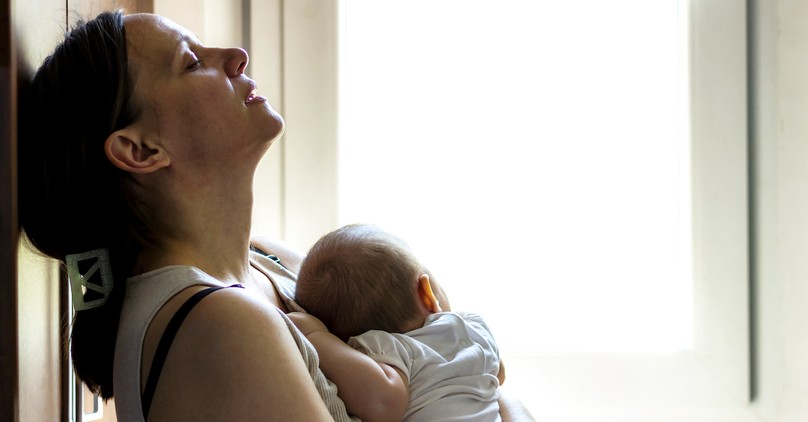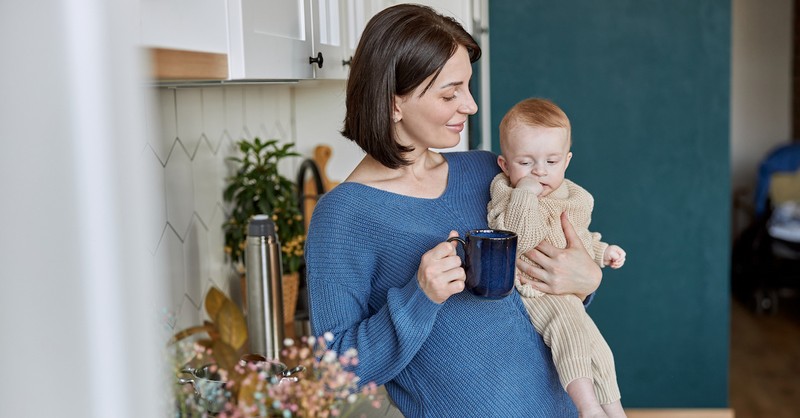
Postpartum Depression is a very real thing, and many women have the stories and emotional and mental battle scars that they will carry with them for the rest of their lives. What is interesting, though, is that long after the initial struggle with PPD is over, those scars can take a long time to form. This means the wounds are carried with the mother for years.
As someone who has experienced Postpartum Depression, the journey is real, and healing can be difficult to find. Many tend to think that once it has received treatment and its brunt force has subsided, it goes away completely, and the mother moves on. Unfortunately, this is not the case. Remnants of Postpartum Depression can be found in guilt, shame, worry, loss of confidence, and more.
There are ways to counteract these remnant wounds. Here are a few ways that can be effective in urging on the journey toward healing:

1. Be open about your continued struggle.
It is typical for a woman to bury her emotions and bully through the act of mothering. Spouses may not be aware of the internal struggle that continues to fester long after the initial wound has been inflicted. Those moments when the shadows of PPD raise their ugly head are not the moments to be silent. No. Instead, though it goes against the grain of many of us, that is the time to ask for support. Admit that your PPD hangover is tough today. That you feel weepy, that you're questioning your performance as a mother, that you feel inept and worthless. True, it may be to a much lesser degree than when you were in the throes of PPD, but even the echoes of it can cause pain and continued damage. Being open about your recovery is pivotal in helping those closest to you know that the healing process is ongoing.

2. Believe that your feelings are not always factual.
We put a lot of stock in our emotions, but frankly, the feelings that circulate within us as we recover from Postpartum Depression are more often than not based on ghosts of concepts. There is a good possibility if someone were to ask you what is wrong, you wouldn't be able to pinpoint a specific thing or event. What this means is that your feelings are not grounded. There isn't an invisible truth that you're dodging. Instead, your feelings result from the hormonal, mental, and emotional anguish your body is processing. When you're feeling guilty, ashamed, afraid, worthless, and so on, you can benefit from going through a list of reminders—sometimes repetitively—to center yourself.
My child is healthy and taken care of. I am not a bad mother for feeling depressed. I have people in my life who support me. Circumstances are not critical right now, and all is well.

3. Forgive yourself.
This is a tough one and can take some time in and of itself. But forgiving yourself, as a mother, is a big hurdle to jump over. As mothers, it is innate that our role is to nurture and protect our children. However, we've just begun to exit a period when we had little interest in our baby, when we wished it wasn't our responsibility, when we were perhaps angry and annoyed at our infant, and when we saw our newborn as an interruption in our life. You may even feel as though you've betrayed your other children by giving birth to a new one, which is another area in which you must seek forgiveness.
When I had my son, I was riddled with guilt for betraying my two-year-old daughter, who now had to share me and didn't adjust particularly well to that. I also was not fond of my son. He was a roadblock to the life I had created with my husband and daughter, and suddenly, life was turned on its axis, and nothing was joyful.
Months later, I looked back on the first few months of my son's life with shame and regret. The countless times I'd walked by him to go to my daughter, the moments I'd wished I'd never had him, and the fantasies I'd devised to give him to someone who really needed a baby. All of it was shameful to me. I had failed as a new mother.
I had to forgive myself. It was not a deliberate choice I'd made to go through that, nor did I still have those thoughts and emotions. But while my fondness for my child had increased exponentially, and now I couldn't imagine our family without him, I still found myself overcompensating to make up for the self-shame. I also berated myself for not being what my son needed at his birth. For those moments I turned my face away. The "how could you's" that I asked myself were great. But the moment I chose to forgive myself and begin fresh was when healing began to take over, and my bond with my son deepened in a way I could never have imagined.

4. Be willing to accept help.
You can't resolve PPD on your own. You simply cannot. Whatever methods need to be taken to crawl from the depths of the darkness, you will heal and recover much faster when you accept help. Whether it's medical help or family support or whether it's humbling yourself and letting your spouse rescue you in those moments, you must become willing to accept help. PPD is not something that can be battled solo. In fact, it's dangerous to do so—for you and your child. Once it has been addressed, keep in mind that you may need continued help weeks, months, or even years down the road. You'll need to talk about it and confide in someone to have a safe place to process the leftover emotions. Stubbornness and independence will not serve you well in the healing process of Postpartum Depression.
In the end, one of the most critical things you can do is recognize that the recovery from Postpartum Depression is ongoing. It is not a four-week prescription to good health. It is not a newfound love and affection for your child. It is a path that you will traverse, and you will have good days and bad days. You'll make good decisions, and then you'll question other decisions. You'll spoil your infant because you feel guilty for how they first came into the world. You'll regret being too soft with them, and then regret being too hard on them. You will question everything you do, think, and say regarding that child, and there may be an affinity to favor them merely because you feel guilty.
Being aware that these side effects exist is critical to healing. They are not side effects that should be ignored, and when they are, more damage can continue.
Be honest with yourself and your spouse. Build a support group of trustworthy influences in your life. Get help to create good and healthy boundaries for you as you parent your child after PPD.
There is hope. You can heal. But acknowledging the journey will relieve the stress as waves come when you least expect them. If you traverse PPD with an ideal of perfection, you will be disappointed and defeated. Know that it is okay not to be okay, and reach out so you can be not okay in a safe environment.
Originally published Tuesday, 25 April 2023.



